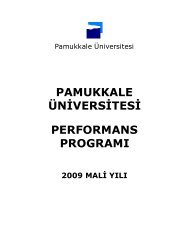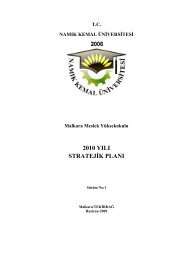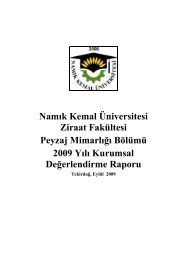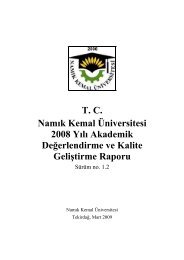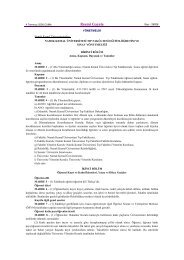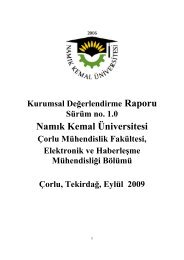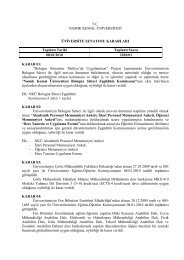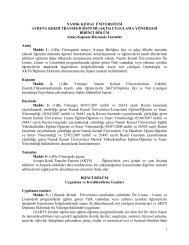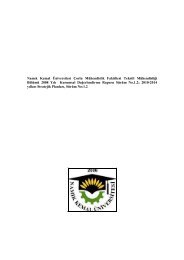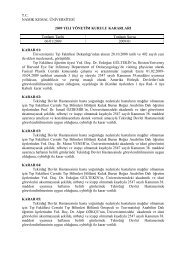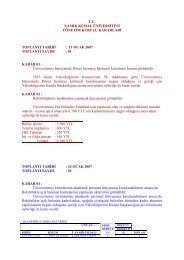Mirik, M., Aysan, Y., Cinar, O. 2008. Biological control of bacterial spot diseaseof pepper with Bacillus strains. Turkısh Journal of Agrıculture and Forestry32 (5): 381-390. (Dr. M. Mirik. <strong>Namık</strong> <strong>Kemal</strong> University, Faculty of Agriculture, Department of PlantProtection. Tekirdag-Turkey) Abstract: Bacterial spot disease caused by Xanthomonas axonopodis pv.vesicatoria (X. axonopodis pv. vesicatoria) is a devastating pepper (Capsicum annuum) disease in Turkey.Biological control of Xanthomonas axanopodis pv. vesicatoria is of great interest, in terms of environmentalsafety and economic return. In this study, 3 Bacillus strains isolated from soil samples of the rhizospheres ofpeppers grown in greenhouses and fields were used to suppress the size of the population of X axonopodispv. vesicatoria. Results indicated that disease development decreased by 11%-62% and 38%-67% in pepperplants inoculated with the 3 Bacillus strains alone and in combination, respectively. in greenhouse and fieldexperiments. In addition, stem diameter, root elongation, root dry weight, shoot dry weight. and yield increasedin response to the treatments in the field experiment by 7.0%-20.5%, 7.0%-17.0%, 4.5%-23.5%. 16.5%-38.5%. and by 11.0%-33.0%. respectively. This is the first study to report the successful biological control ofbacterial spot disease caused by X. axonopodis pv. vesicatoria using Bacillus species in TurkeyOzder, N., Effect of cold storage of adult Trichogramma brassicae, T. cacoeciaeand T. evanescens (Hym.: Trichogrammatidae). Archives of Phytopathologyand Plant Protection 41 (4): 296-299. (Prof.Dr. N.Ozder. <strong>Namık</strong> <strong>Kemal</strong> University, Faculty ofAgriculture, Department of Plant Protection. Tekirdag-Turkey)Abstract: Trichogramma cacoeciae Marchall, T.brassicae Bezdenko and T. evanescens Westwood could be useful in biological control programmes ofagricultural insect pest. The possibility of storing adult Trighogramma species at low temperatures, and theeffect of such storage on the quality of the parasitoids and its fecundity were studied. Trighogrammacacoeciae, T. brassicae and T. evanescens adults were stored for 1, 2, 3, 4 and 5 days at 41C in arefrigerator, 60-70%RH and full darkness. Storage at 41C reduced fecundity and longevity of femaleparasitoids.Ozder, N and Saglam, O. 2008. Effect of temperature on the biology ofTuberolachnus salignus (Gmelin) (Sternorrhyncha: Aphididae) ON (Salixalba). Journal of Central European Agriculture 9 (1):155-159. (Prof.Dr. N.Ozder,Research Asist. O.Saglam. <strong>Namık</strong> <strong>Kemal</strong> University, Faculty of Agriculture, Department of Plant Protection.Tekirdag-Turkey) Abstract: The development time, survivourship and reproduction of Tuberolachnus salignus(Lachninae: Lachnini) were studied on Salix alba at five constant temperatures (17.5, 20, 22.5, 25 and 27.5C).The developmental time of immature stages ranged from 17.00 days at 17.5C to 12.21 days at 25C on S.alba. The total percentage of survivourship of immature stages varied from 50 to 70% at 17.5 to 20C on S.alba. The largest r m value occurred with 0.2540 at 20C on S. alba. The mean generation time of the populationranged from 13.595 days at 22.5C to 19.60 days at 17.5C on S. alba. The optimum temperature for T.salignus was 20C.Bilimsel Tam Metni Basılmış Uluslar arası BildirilerSunulu BildirilerĐlbağı, H., Çıtır, A. and Bostan, H. 2008. “Prunus spinosa L. a natural wild hostof some important fruit viruses in Tekirdağ. Proceedings of the TwentiethInternational Symposium on Virus and Virus-like Diseases of TemperateFruit Crops, Fruit Tree Diseases, Antalya, Turkey. Acta Horticulturae 781:33-36. (Assoc. Prof.Dr. Đlbağı, H. and Prof.Dr. A. Citir. <strong>Namık</strong> <strong>Kemal</strong> University, Faculty of Agriculture,Department of Plant Protection, Tekirdağ-Turkey.) Abstract: Blackthorn Prunus spinosa L. is a wide spreadbush along the road sides, water canals, field borders and hedgerows throughout the Trakya region of Turkey,especially in the Tekirdag province. Fifty four symptom expressing bushes were tested serologically withDouble antibody sandwich enzyme linked immunosorbent assay (DAS-ELISA) tests by employing antiseraagainst Plum pox virus (PPV), Apple chlorotic leaf spot virus (ACLSV) and Apple mosaic virus (ApMV). DAS-ELISA test results revealed that 13 out of 54 samples were found infected by PPV with a rate of 24.1%, 8 outof 54 samples contained ACLSV with a rate of 11.1% and 12 out of 54 of them had ApMV with a rate of22.2%. One of the PPV infected samples was also subjected to reverse transcription-polymerase chainreaction (RT-PCR) molecular test by isolating RNA from PPV infected leaves. By amplifying specific primers ofPPV-M strain, a band was detected 198 bp fragment. The result of DAS-ELISA and RT-PCR test revealed the34
presence of PPV-M race as well as ACLSV and ApMV in the blackthorn bushes in Tekirdag. Presence ofthese viruses in blackthorn bushes make them potential sources of PPV, ACLSV and ApMV in the area whichcreates a serious threat to newly established fruit orchards in the Trakya region of Turkey. By evaluatingserological and the molecular tests this is the first report of the PPV, ACLSV and ApMV which were identifiedon Prunus spinosa L. in Turkey.Çıtır, A. and Đlbağı, H. 2008. Serological identification of some important viruseson fruit trees and bushes in Tekirdağ province of Turkey.” Proceedings of theTwentieth International Symposium on Virus and Virus-like Diseases ofTemperate Fruit Crops, Fruit Tree Diseases, Antalya, Turkey. ActaHorticulturae 781: 103-106. (Prof.Dr. A. Citir. and Assoc. Prof.Dr. Đlbağı, H. <strong>Namık</strong> <strong>Kemal</strong>University, Faculty of Agriculture, Department of Plant Protection, Tekirdağ-Turkey.) Abstract: Fruit trees ofsmall- fruited apple: Malus pumila Mill., plum: Prunus domestica L., apricot: Prunus armenica L., medlar:Mespilus germanica L., blackberry: Rubus fruticosus L. and hawthorn: Crataegus sp. were investigated forthe presence of viruses like Plum pox virus (PPV), Apple chlorotic leaf spot virus (ACLSV) and Apple mosaicvirus (ApMV) in the Tekirdağ Province in Turkey. Double antibody sandwich enzyme linked immunosorbentassay (DAS-ELISA) tests were applied on leaf samples collected from symptom expressing trees and bushes.DAS-ELISA test results revealed that; 4 out of 9 apricot trees infected with PPV, 4 of them had ACLSV as 2 ofthem infected with ApMV as a cause of mixed infections with others. 2 out of 12 plum trees infected with PPVand 2 of them had ACLSV. 1 out of 4 M. pumila tree was infected with ACLSV and the other one had ApMV.One symptom expressing medlar tree however was infected with ApMV in the Tekirdağ province. 4 out of 5symptom expressing hawthorn bushes were found infected with only ApMV as one blackberry bush containedApMV too. All of these results imply that PPV, ACLSV and ApMV viruses have considerable amount ofsources of inoculum in the Tekirdağ province where establishment of many fruit orchards were initiated andsupported by Minister of Agriculture and Rural Affairs in every proper location. By evaluating serological testthis is the first report of the detection of ApMV on medlar, blackberry and hawthorn in Turkey.Bilimsel Özet Metni Basılmış Uluslar arası BildirilerPoster BildirilerÖzer, N., 2008. Major seed-borne fungal diseases of onion (Allium cepa). Journalof Plant Pathology 90: 182. Prof.Dr. Ozer, N.<strong>Namık</strong> <strong>Kemal</strong> University, Faculty of Agriculture,Department of Plant Protection, Tekirdağ-Turkey.) Abstract: Aspergillus niger, Botrytis aclada and Fusariumoxysporum f. sp. cepae are relevant seed-borne fungi of onion (Allium cepa L.) and are known as causalagents of black mould, neck rot and basal rot diseases, respectively. These pathogens can be transmittedfrom infected seeds to seedling, sets or bulbs. Pectolytic enzymes and isoenzymes of these pathogenscontribute to virulence during onion seed or bulb colonization. They eventually kill the entire plants throughdegradation of the tissues. Any onion cultivar, at high resistant degree to A. niger has not been considered.Resistance to B. aclada was determined by using transplants and bulbs. Numerous onion lines and cultivarswere found as resistance to F. oxysporum f. sp. cepae under different experimental conditions. The resistancemechanism of onion to these pathogens was examined. Chemical treatments are generally suggested for theircontrol. In recent years, alternative compounds or treatments to pesticides were evaluated.35
- Page 1 and 2: Namık Kemal Üniversitesi ZiraatFa
- Page 3 and 4: Tablo ListesiSayfaTablo 1. Bölüm
- Page 5: 3. Sunuş- Bu belge ile Namık Kema
- Page 9 and 10: 5. Yönetici Özeti- Namık Kemal
- Page 11 and 12: 8. Bölüm organizasyon şeması- 2
- Page 13 and 14: Tablo 5. Bitki Koruma Bölümü Aka
- Page 15 and 16: Tablo 7. Birim lisans programları
- Page 17 and 18: Tablo 9. Kurumsal Nitelikler Veri T
- Page 19 and 20: X Đdari personel eğitim düzeyi -
- Page 21 and 22: Tablo 11. Bölüm 2008 Yılı Ağı
- Page 23 and 24: Tablo 14. Bölüm ProgramlarıSıra
- Page 25 and 26: Tablo 16. Bitki Koruma Bölümü Y
- Page 27 and 28: Dersin Adı: BĐTKĐ BÖCEK ĐLĐŞ
- Page 29 and 30: 7.4.1. Bölüm ISI Atıf Dizinlerin
- Page 31 and 32: Özer, N., Köycü, N. D., Chilosi,
- Page 33: Đlbağı,H., Rabenstein, F., Habek
- Page 37 and 38: H. Dergi yayın tecrübesi (toplam)
- Page 39 and 40: ilişkilerin yeterliliği;13) Yaşa
- Page 42: Paydaş analiziTablo 26. Paydaşlar
- Page 46 and 47: - 2547 ve 5018 sayılı kanunlar ç
- Page 48 and 49: Tablo 4 Öğretim elemanı gelişim
- Page 50 and 51: 16. Sonuç1982 yılında kurulmuş
- Page 52 and 53: Dersin Adı: Bitki HastalıklarıZo
- Page 54 and 55: Dersin Adı: Bahçe Bitkileri Zarar
- Page 56 and 57: Dersin Adı: Bahçe Bitkileri Hasta
- Page 58 and 59: Đşlenme yöntemi: English for Int
- Page 60 and 61: Bitkisel üretim esnasında ortaya
- Page 62 and 63: FUNGĐSĐTLERHastalıklara karşı
- Page 64 and 65: literatür bilgileri ve diğer ara
- Page 66 and 67: Sayısal LES Puan ortalaması=59.97
- Page 68 and 69: Öğretim üyesi başına düşenar
- Page 70 and 71: Đl dışından gelen öğrenci say
- Page 72 and 73: dallarının kendi aralarındaoluş
- Page 74 and 75: önlisans/lisans ve lisansüstüö
- Page 76 and 77: 33(x)öğrenci sayısı toplamı=86
- Page 78 and 79: yılın Doktora mezun sayısı=Değ
- Page 80 and 81: Toplam lisans, yüksek lisans ve do
- Page 82 and 83: 41(x)Seçmeli derslerin oranı41.1.
- Page 84 and 85:
ders saati(Ön Lisans, Lisans, Lisa
- Page 86 and 87:
49 Alınan patent sayısı (faydal
- Page 88 and 89:
55(x)Kütüphanede takip edilen bas
- Page 90 and 91:
sayısı / Toplam öğrenci sayıs



